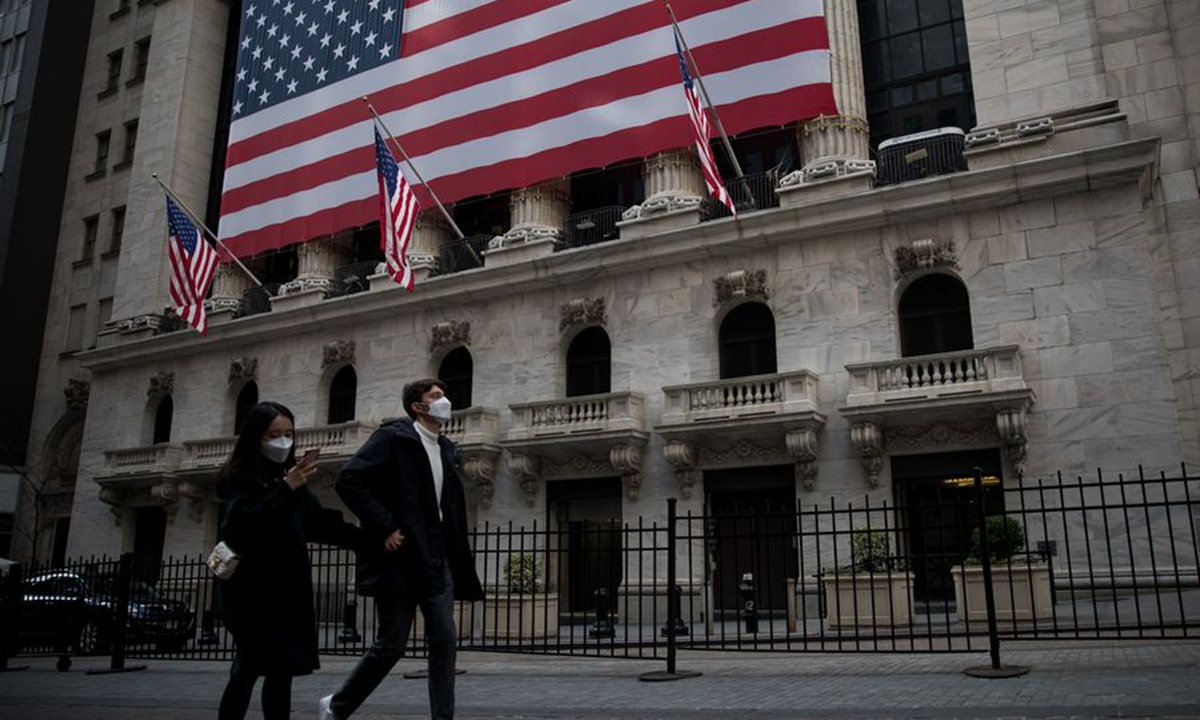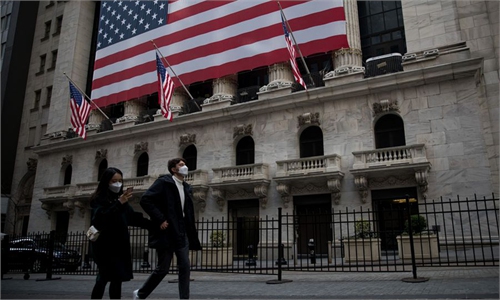Chinese companies’ delisting a response to US coercion, not choice of decoupling

Pedestrians wearing face masks walk past the New York Stock Exchange in New York, the US. Photo: Xinhua
Five Chinese state-owned giants - China Life Insurance, PetroChina, Sinopec, Aluminum Corporation of China, and Sinopec Shanghai Petrochemical - have announced they will delist from the New York Stock Exchange (NYSE). It is important to understand exactly what the delisting means, without either underestimating or overstating the significance.
The five companies' choice, as well as the case - Alibaba Group announced last month that it was planning a dual primary listing in Hong Kong, getting ready to possibly delist from the US - means this is certainly not an isolated case. But I see some people on the internet are saying that China and the US are about to decouple completely, and that China is ready to fight against the US. This obviously exaggerates the nature of the matter.
The direct reason for the delisting of Chinese companies from the US is the Holding Foreign Companies Accountable Act (HFCAA) in the US, which took effect in 2021 and stipulates more stringent audit requirements. In terms of China-related issues, the most controversial part of the act is the requirement for Chinese companies listed in the US to hand over audit documents. Since companies like PetroChina and Sinopec are among China's national-level strategic enterprises, it is unlikely that they will hand over all their internal audit documents to the US side so that the latter can have access to everything inside the company - this involves China's national security. China and the US have been negotiating on this issue, but no consensus has been reached. Chinese companies that do not fulfill the US audit requirements for three years will be delisted, and many Chinese companies such as Alibaba and JD.com have already been put on the US "pre-delisting" list.
Having explained the reason, we now can all understand that the decision by some US-listed Chinese companies to delist from the US is not a proactive choice by China, but a response to coercion from the new regulations in the US. The big companies that announced their delisting on Friday have been listed on multiple exchanges and the volume of their listing in the US is not big, so the impact of delisting from the NYSE will be limited.
It is important to see that this is a struggle over the audit, but on the other hand, the issue is not so "simple." China has its own national conditions, and if there is sufficient political trust between China and the US, it would be possible to settle the dispute through negotiation. However, since the US launched the trade war, there has been extreme rhetoric in the US arguing that China is taking advantage of Chinese companies' listing in the US and that the US side is "feeding potential threats." The audit dispute has become more prominent in this context, and it could even be argued that the HFCAA is aimed mainly at Chinese companies.
In the past, the listing of Chinese companies in the US was defined and treated as a financial matter. Chinese companies were able to enter the US' mature financial markets and use the massive capital pool there. At the same time, through these tremendous Chinese companies, US investors could enjoy the dividends of China's reform and opening-up and its rapid development. Moreover, the US was able to consolidate its position as the leading global capital market due to the entry of these Chinese companies. It was win-win in every sense.
Today, the US' thinking is based too much on politics. The new bills are intertwined with politics, which has seriously increased the complexity and difficulty of China-US economic exchanges. It is impossible for China to make unlimited concessions to the US or sacrifice its own national security and legitimate interests of its companies. The delisting of many Chinese state-owned enterprises from the US is our countermeasure to safeguard our security and development rights.
However, I do not think this is a watershed event showing that China is beginning to actively decouple from the US. I also do not believe that the ties between China and the US in various fields will be cut off at an accelerated rate like dominoes. I believe that China will try its best to maintain the overall economic and social exchanges, and we will not act impulsively in this regard. The US has cut at the root of the big tree of China-US cooperation, but China will not rashly do the same. Since China-US cooperation is in line with the US' interests in the globalization era, the US' decoupling from China will not be so easy. This is because the Chinese market is huge, and the US would be harming itself and ceding opportunities to its Western competitors.
China will resolutely defend its core interests and is not afraid of conflict with the US. However, conflict is not China's goal, and so-called decoupling from the US is not China's wish. I believe that China will adhere to the path of opening up to the outside world. Although the environment has become more complicated and difficulties have increased significantly, closing the door will never be China's choice. But of course, China will prepare various plans to deal with extreme actions by the US and maintain the bottom line thinking.
The author is a commentator with the Global Times. opinion@globaltimes.com.cn


